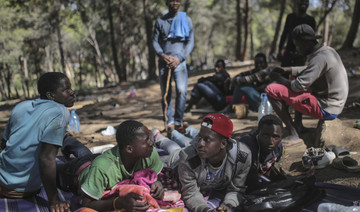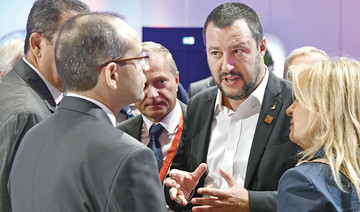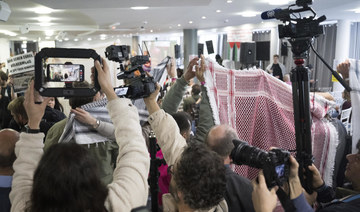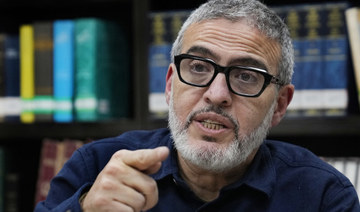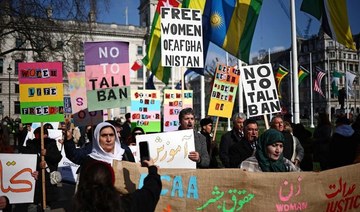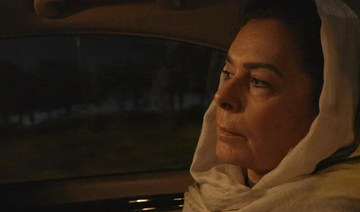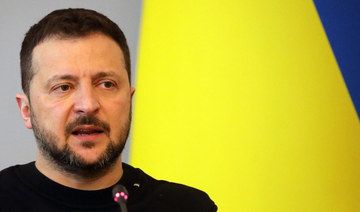MADRID: They scale barbed-wire topped fences and cross the sea in inflatable boats or jet skis — more than 36,000 migrants entered Spain this year seeking a better life in Europe. Almost all of them relied on smugglers to make the crossing. Ousman Umar, who made a five-year journey from Ghana to Spain, said it was “impossible” to travel thousands of kilometres from sub-Saharan Africa through deserts and other inhospitable areas without the aid of gangs.
“There is almost no chance of reaching Europe illegally” without paying traffickers, Robert Crepinko, the head of the human smuggling unit at Europol, the European Union's policing arm, told AFP. Ninety percent of migrants who enter Europe are helped by human traffickers, he added, citing a 2015 study.
Spain has become the main entry point for migrants arriving this year, after Italy and Greece. “The journey can last one year, two years, depending on the ring and the funds you have, because the trafficking networks will take you as far as you can pay,” Jose Nieto Barroso of the national police's human smuggling unit UCRIF told AFP.
Migrants gather in Morocco because “it's the best place to wait for the right moment to cross” over to Spain, said Nieto Barroso.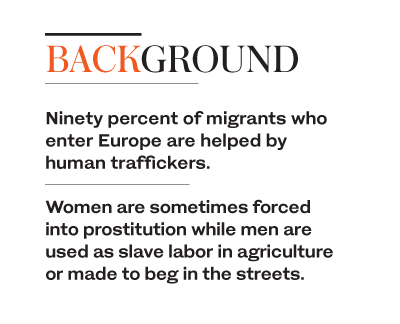
The vast majority pay for a spot on an inflatable dinghy or to take part in a mass run on the heavily fortified border fences that surround Ceuta and Melilla, two tiny Spanish territories in North Africa that share the EU's only land borders with Africa. Human traffickers charge 18 euros ($21) to try to scale the border fences, 200-700 euros to join a packed boat to cross the narrow Strait of Gibraltar separating Spain from Morocco by just 15 kilometers (9 miles) at its narrowest point, or up to 5,000 euros to make the trip by jet ski, according to Spanish police. Europol estimates migrants pay on average €3,000-5,000 for a complete trip to Europe. Once in Spain, many want to move on to wealthier northern European countries like Britain, France and Germany where they believe they will have better opportunities, or because they already have family there. Once again, human traffickers play a role in getting them there. The smugglers promise migrants they will be rescued at sea by the Spanish coast guard and then taken to migrant reception centers where “in three or four days members of the network will be in the area and get you out,” Nieto Barroso said. The gang will then take the migrants to another country or, in worst-case scenarios, pass them on to other gangs that exploit them. Women are sometimes forced into prostitution while men are used as slave labor in agriculture or made to beg in the streets. The rings “supply people. They say: 'I have 8, 12, 15 people from the sub-Sahara who can be put to work',” said Nieto Barroso.
Gangs take advantage of the “brutal collapse” of overcrowded migrant reception centers, and gain access to migrants through nonprofit organizations which work with the newcomers, he added. Paloma Favieres of the Spanish Committee for Refugee Aid (CEAR) denounced the reception Spain gives migrants as “chaotic.”
She said she notifies police whenever she believes a migrant is at risk of falling prey to human traffickers but stressed it was up to police “to fight against crime.”
“I don't get any help from the police,” she told AFP.
With migrant arrivals to Spain's southern shores on the rise, more of them are heading north to the border town of Irun, some sleeping rough as they wait to cross into neighbouring France, or to Santander, where police in August arrested two people for hiding migrants in their vehicle which was going to board a ferry bound for Britain.
Police smashed 25 human trafficking rings in Spain last year but many more remain active in Africa, recruiting more migrants.
Smugglers pave path for migrants from Africa to Europe
Smugglers pave path for migrants from Africa to Europe
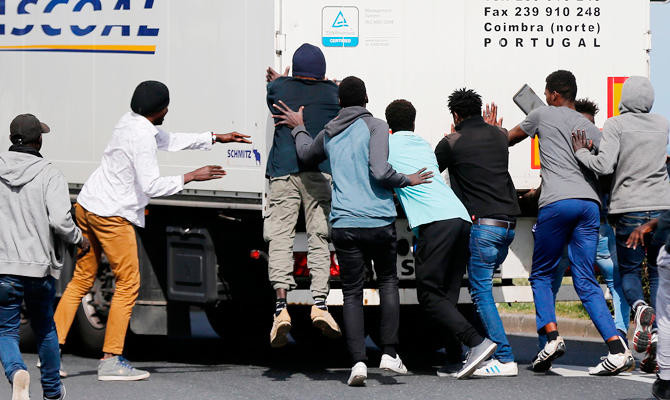
- Migrants gather in Morocco because “it's the best place to wait for the right moment to cross” over borders with Africa
- Europol estimates migrants pay on average €3,000-5,000 for a complete trip to Europe
Sadiq Khan, Pakistani immigrant bus driver’s son, makes history by winning third term as London mayor
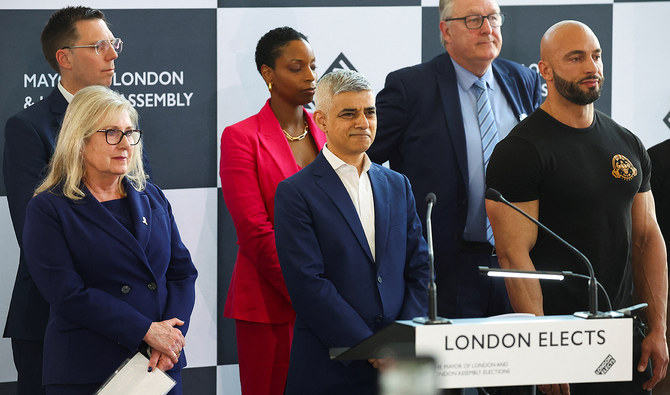
- Khan, an official with global renown, became the first Muslim mayor of a Western capital when elected in 2016
- Born in London in 1970, he grew up in public housing the Tooting area and slept in a bunk-bed until he was 24
LONDON: Sadiq Khan, who was Saturday re-elected for a record third term as London mayor, rose from humble roots to spar with world leaders and bring consequential change to the British capital.
The 53-year-old Labor party politician – a former human rights lawyer brought up on a London public housing complex – comfortably defeated Conservative rival Susan Hall for a third stint at City Hall.
He now overtakes predecessor Boris Johnson as the longest-serving holder of the post, which notably has powers over the emergency services, transport and planning in the city of nearly nine million.
Victory continues a remarkable journey for the Pakistani immigrant bus driver’s son, who became the first Muslim mayor of a Western capital when initially elected in 2016.
As mayor, he has made a name for himself as a vocal critic of Brexit and successive Conservative prime ministers, including Johnson, as well as for a feud with former US president Donald Trump.
The pair became embroiled in an extraordinary war of words after Khan criticized Trump’s travel ban on people from certain Muslim countries.
Trump then accused Khan of doing a “very bad job on terrorism” and called him a “stone cold loser” and a “national disgrace.”
The mayor in turn allowed an infamous blimp of Trump dressed as a baby in a nappy to fly above protests in Parliament Square during his 2018 visit to Britain.
“He once called me a stone cold loser. Only one of us is a loser, and it’s not me,” Khan told AFP during his 2021 campaign.
But Khan’s own tenure has not been without its controversies, particularly over last year’s expansion of an Ultra-Low Emission Zone into the largest pollution-charging scheme in the world.
The daily toll on the most-polluting vehicles prompted a fierce backlash in outer boroughs of Greater London, with anger at the extra financial burden during a cost-of-living crisis.
Khan has also been criticized for failing to get to grips with high levels of knife crime and since last year, his handling of large weekly pro-Palestinian protests.
Born in London in 1970 to parents who had recently arrived from Pakistan, Khan was the fifth child out of seven brothers and one sister.
He grew up in public housing in Tooting, an ethnically mixed residential area in south London, and slept in a bunk-bed until he was 24.
His modest background plays well in a city that is proud of its diversity and loves a self-made success story.
Khan still regularly recalls how his father drove one of London’s famous red buses, and his mother was a seamstress.
He is a handy boxer, having learnt the sport to defend himself in the streets against those who hurled racist abuse at him, and two of his brothers are boxing coaches.
He initially wanted to become a dentist, but a teacher spotted his gift for verbal sparring and directed him toward law.
He gained a law degree from the University of North London and started out as a trainee lawyer in 1994 at the Christian Fisher legal firm, where he was eventually made a partner.
He specialized in human rights, and spent three years chairing the civil liberties campaign group Liberty.
He represented Louis Farrakhan, leader of the Nation of Islam movement, and Babar Ahmad, a mosque acquaintance who was jailed in the United States after admitting providing support to the Taliban regime in Afghanistan.
Khan joined Labor aged 15 when Conservative prime minister Margaret Thatcher was in her pomp.
He became a local councilor for Tooting in the Conservative-dominated Wandsworth local borough in 1994, and its member of parliament in 2005.
He still lives in the area with his lawyer wife Saadiya and their two teenage daughters.
Labor prime minister Gordon Brown made him communities minister in 2008 and he later served as transport minister, becoming the first Muslim minister to attend Cabinet meetings.
In parliament, he voted for gay marriage – which earned him death threats.
As mayor, he vowed to focus on providing affordable homes for Londoners and freezing transport fares, but – like many in power around the world – saw his agenda engulfed by the pandemic.
He is London’s third mayor after Labor’s Ken Livingstone (2000-2008) and Johnson (2008-2016), with widespread speculation he could eventually try to follow in his predecessor and become prime minister.
London mayor Khan wins historic third term as Tories routed in local polls

- Khan, 53, easily beat Tory challenger Susan Hall to scupper largely forlorn Tory hopes that they could prise the UK capital away from Labour for the first time since 2016
- In the West Midlands, where Tory incumbent Andy Street is bidding for his own third term, votes were reportedly being recounted and too close to call
LONDON: London’s Labour mayor Sadiq Khan on Saturday secured a record third term, dealing the Conservatives another damaging defeat in their worst local election results in recent memory months before an expected general election.
Khan, 53, easily beat Tory challenger Susan Hall to scupper largely forlorn Tory hopes that they could prise the UK capital away from Labour for the first time since 2016.
The first Muslim mayor of a Western capital when first elected then, he had been widely expected to win as Labour surge nationally and the Conservatives suffer in the polls.
In the end, he saw his margin of victory increase compared to the last contest in 2021.
It adds to a dismal set of results for Prime Minister Rishi Sunak, as his Tories finished a humiliating third in local council tallies after losing nearly 500 seats in voting Thursday across England.
With Labour making huge gains, the beleaguered leader’s Conservatives lost crunch mayoral races in Manchester, Liverpool, Yorkshire as well as the capital and elsewhere.
In the West Midlands, where Tory incumbent Andy Street is bidding for his own third term, votes were reportedly being recounted and too close to call.
An unexpected Tory defeat there could leave Sunak with only one notable success: its mayor winning a third term in Tees Valley, northeast England — albeit with a vastly reduced majority.
Writing in Saturday’s Daily Telegraph, Sunak conceded “voters are frustrated” but insisted “Labour is not winning in places they admit they need for a majority.”
“We Conservatives have everything to fight for,” Sunak argued.
Labour, out of power since 2010 and trounced by Boris Johnson’s Conservatives at the last general election in 2019, also emphatically snatched a parliamentary seat from the Conservatives.
It seized on winning the Blackpool South constituency and other successes to demand a national vote.
“Let’s turn the page on decline and usher in national renewal with Labour,” party leader Keir Starmer told supporters Saturday in the East Midlands, where the party won the mayoral race.
Sunak must order a general election be held by January 28 next year at the latest, and has said he is planning on a poll in the second half of 2024.
Labour has enjoyed double-digit poll leads for all of Sunak’s 18 months in charge, as previous Tory scandals, a cost-of-living crisis and various other issues dent the ruling party’s standing.
On Thursday, they were defending nearly 1,000 council seats, many secured in 2021 when they led nationwide polls before the implosion of Johnson’s premiership and his successor Liz Truss’s disastrous 49-day tenure.
With almost all those results in by Saturday afternoon, they had lost close to half and finished third behind the smaller centrist opposition Liberal Democrats.
If replicated in a nationwide contest, the tallies suggested Labour would win 34 percent of the vote, with the Tories trailing by nine points, according to the BBC.
Sky News’ projection for a general election using the results predicted Labour will be the largest party but short of an overall majority.
Its by-election scalp in Blackpool — on a mammoth 26-percent swing — was the Conservatives’ 11th such loss in this parliament, the most by any government since the late 1960s.
Speculation has been rife in Westminster that restive Tory lawmakers could use the dire local election results to try to replace him. But that prospect seems to have failed to materialize.
However, it was not all good news for Labour.
The party lost control of one local authority, and suffered some councillor losses to independents elsewhere, due to what analysts said was its stance on the Israel-Hamas war.
Polling expert John Curtice assessed there were concerning signs for the opposition.
“These were more elections in which the impetus to defeat the Conservatives was greater than the level of enthusiasm for Labour,” he noted in the i newspaper.
“Electorally, it is still far from clear that Sir Keir Starmer is the heir to (Tony) Blair.”
A British-Palestinian doctor was denied entry to France for a Senate meeting about the war in Gaza
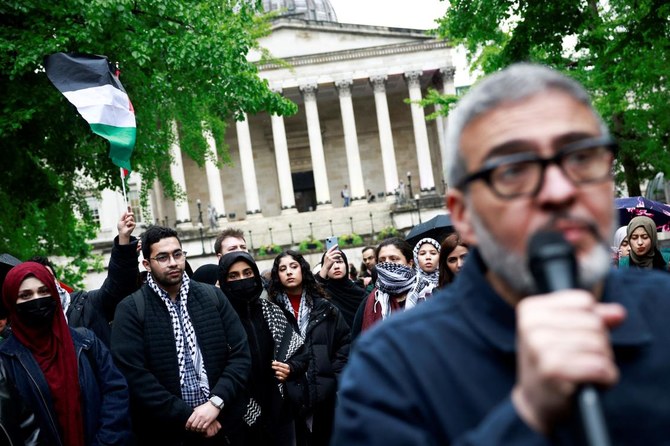
- Dr. Ghassan Abu Sitta was placed in a holding zone in the Charles de Gaulle airport and will be expelled, according to French Sen. Raymonde Poncet Monge
- Abu Sitta posted on social networks that he was denied entry in France because of a one-year ban by Germany on his entry to Europe
PARIS: A well-known British-Palestinian surgeon who volunteered in Gaza hospitals said he was denied entry to France on Saturday to speak at a French Senate meeting about the Israel-Hamas war. Authorities wouldn’t give a reason for the decision.
Dr. Ghassan Abu Sitta was placed in a holding zone in the Charles de Gaulle airport and will be expelled, according to French Sen. Raymonde Poncet Monge, who had invited him to speak at the Senate.
‘’It’s a disgrace,’’ she posted on X.
Abu Sitta posted on social networks that he was denied entry in France because of a one-year ban by Germany on his entry to Europe. Germany denied him entry last month, and France and Germany are part of Europe’s border-free Schengen zone. He posted Saturday that he was being sent back to London.
The French Foreign Ministry, Interior Ministry, local police and the Paris airport authority would not comment on what happened or give an explanation.
Abu Sitta had been invited by France’s left-wing Ecologists group in the Senate to speak at a colloquium Saturday about the situation in Gaza, according to the Senate press service. The gathering included testimony from medics, journalists and international legal experts with Gaza-related experience.
Last month Abu Sitta was denied entry to Germany to take part in a pro-Palestinian conference. He said he was stopped at passport control, held for several hours and then told he had to return to the UK He said airport police told him he was refused entry due to “the safety of the people at the conference and public order.”
Abu Sitta, who recently volunteered with Doctors Without Borders in Gaza, has worked during multiple conflicts in the Palestinian territories, beginning in the late 1980s during the first Palestinian uprising. He has also worked in other conflict zones, including in Iraq, Syria and Yemen.
France has seen tensions related to the Mideast conflict almost daily since the deadly Oct. 7 Hamas incursion into Israel. In recent days and weeks police have cleared out students at French campuses holding demonstrations and sit-ins similar to those in the United States.
Afghanistan’s only female diplomat resigns in India after gold smuggling allegations
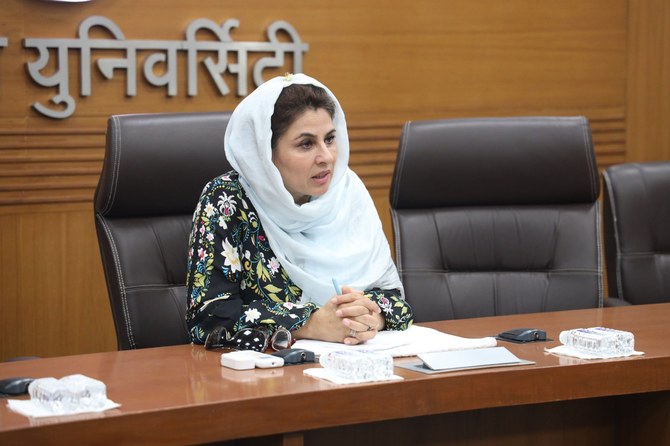
- Zakia Wardak, the Afghan consul-general for Mumbai, announced her resignation on her official account on the social media platform X
- According to Indian media reports, she has not been arrested because of her diplomatic immunity
ISLAMABAD: Afghanistan’s diplomat in India, who was appointed before the Taliban seized power in 2021 and said she was the only woman in the country’s diplomatic service, has resigned after reports emerged of her being detained for allegedly smuggling gold.
Zakia Wardak, the Afghan consul-general for Mumbai, announced her resignation on her official account on the social media platform X on Saturday after Indian media reported last week that she was briefly detained at the city’s airport on allegations of smuggling 25 bricks of gold, each weighing 1 kilogram (2.2 pounds), from Dubai.
According to Indian media reports, she has not been arrested because of her diplomatic immunity.
In a statement, Wardak made no mention of her reported detention or gold smuggling allegations but said, “I am deeply sorry that as the only woman present in Afghanistan’s diplomatic apparatus, instead of receiving constructive support to maintain this position, I faced waves of organized attacks aimed at destroying me.”
“Over the past year, I have encountered numerous personal attacks and defamation not only directed toward myself but also toward her close family and extended relatives,” she added.
Wardak said the attacks have “severely impacted my ability to effectively operate in my role and have demonstrated the challenges faced by women in Afghan society.”
The Taliban Foreign Ministry did not immediately return calls for comment on Wardak’s resignation. It wasn’t immediately possible to confirm whether she was the country’s only female diplomat.
She was appointed consul-general of Afghanistan in Mumbai during the former government and was the first Afghan female diplomat to collaborate with the Taliban.
The Taliban — who took over Afghanistan in 2021 during the final weeks of US and NATO withdrawal from the country — have barred women from most areas of public life and stopped girls from going to school beyond the sixth grade as part of harsh measures they imposed despite initial promises of a more moderate rule.
They are also restricting women’s access to work, travel and health care if they are unmarried or don’t have a male guardian, and arresting those who don’t comply with the Taliban’s interpretation of hijab, or Islamic headscarf.
Russia puts Ukraine's Zelensky on wanted list, TASS reports

- Russia has issued arrest warrants for a number of Ukrainian and other European politicians
MOSCOW: Russia has opened a criminal case against Ukrainian President Volodymyr Zelensky and put him on a wanted list, the state news agency TASS reported on Saturday, citing the Interior Ministry's database.
The entry it cited gave no further details.
Russia has issued arrest warrants for a number of Ukrainian and other European politicians since the start of the conflict with Ukraine in February 2022.
Russian police in February put Estonian Prime Minister Kaja Kallas, Lithuania's culture minister and members of the previous Latvian parliament on a wanted list for destroying Soviet-era monuments.
Russia also issued an arrest warrant for the International Criminal Court (ICC) prosecutor who last year prepared a warrant for President Vladimir Putin on war crimes charges.


